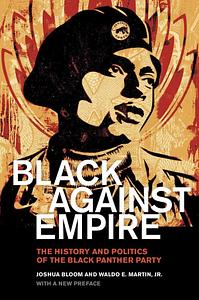Take a photo of a barcode or cover
166 reviews for:
Black against Empire: The History and Politics of the Black Panther Party
Joshua Bloom
166 reviews for:
Black against Empire: The History and Politics of the Black Panther Party
Joshua Bloom
Between 1968 and 1970 the Black Panther Party was the vanguard of the revolutionary moment the United States was experiencing. They got there over a period of years of solid organizing, and through a charismatic leadership that positioned the Party as the armed defenders of ghetto communities they likened to occupied zones within the imperium. Huey Newton and company pointed the finger at police brutality, and pointed guns when necessary. It was by following California gun laws to an end no one expected, and then following through with social programs, a somewhat inchoate but powerful Marxist rhetoric, and a willingness to build power through cooperation and in some cases cooptation with and of other black power and civil rights organizations. It didn't hurt that the US was absolutely ripe for the moment, fighting an unpopular war in VietNam, a war of ghetto oppression, and a war repressing the liberal peace movement. The established power structure really didn't know what was hitting it, and it responded as power does when it's threatened. And, as if it were textbook, repression built resistance. The BPP thrived. But, the BPP was a mixed bag of programs, and an internal mess of power plays in which gangsterism would raise its head along side vital community service, in which factions vied for autonomy, and leadership, in which gender and gay equality fought and won battles within, and in which the national organization led with a very heavy hand.
Eventually, the Party imploded, and the radical community has been picking up the pieces ever since.
Black Against Empire is another attempt to pick up the pieces. It's a fascinating story, made more fascinating for me because of my proximity to the Party and its activities. I was in Chicago. There were two factions in the politics I was attracted to: those who wanted to end the war, and those who wanted to smash the state. I wanted to smash the state, and the Panthers, SDS and the Weathermen, Rising Up Angry, and the Yippies (my gang) were the milieu in which I liked to raise my fist. We did think we were making a revolution. Fred Hampton's assassination proved it, the trial of the Chicago 8 proved it, the Days of Rage proved it - well, those things proved we had a moment, the student uprisings and the revolutionary gangs of Europe, and Mexico reinforced the moment, the reaction of the authorities gave us phrases like "chaos builds community," but we were wrong, and were easily co-opted.
The BPP was not an insurgency, and neither were the other groups I loved so much. Once state power figured out that giving in on a few thing would weaken us faster than all the SWAT teams in the world, we quickly fell apart, took our cookies, and went back to school, or work, or the farm, or wherever.
Anyway, I'm going on now as obnoxiously as we did then.
My biggest quibbles with Black Against Empire lie in the field of language, and an inflated importance of events.. Riots were not insurrections or rebellions, the over blown titles of authority the Panthers gave themselves were ridiculous, then and now, and the movement was really a moment - longer lasting than the Occupy moment, but a moment - none the less. Black Against Empire tries to make it bigger than that, but the fact is, it was big enough. That we're still enthralled has to tell us something.
Given that, this was a good read, and a good look at the scope of the Party in its heyday. Its scope was great, and shines in the history of US radicalism, and its good for us to know about it - and to celebrate what was good. And, hey, berets and black leather - amen.
Eventually, the Party imploded, and the radical community has been picking up the pieces ever since.
Black Against Empire is another attempt to pick up the pieces. It's a fascinating story, made more fascinating for me because of my proximity to the Party and its activities. I was in Chicago. There were two factions in the politics I was attracted to: those who wanted to end the war, and those who wanted to smash the state. I wanted to smash the state, and the Panthers, SDS and the Weathermen, Rising Up Angry, and the Yippies (my gang) were the milieu in which I liked to raise my fist. We did think we were making a revolution. Fred Hampton's assassination proved it, the trial of the Chicago 8 proved it, the Days of Rage proved it - well, those things proved we had a moment, the student uprisings and the revolutionary gangs of Europe, and Mexico reinforced the moment, the reaction of the authorities gave us phrases like "chaos builds community," but we were wrong, and were easily co-opted.
The BPP was not an insurgency, and neither were the other groups I loved so much. Once state power figured out that giving in on a few thing would weaken us faster than all the SWAT teams in the world, we quickly fell apart, took our cookies, and went back to school, or work, or the farm, or wherever.
Anyway, I'm going on now as obnoxiously as we did then.
My biggest quibbles with Black Against Empire lie in the field of language, and an inflated importance of events.. Riots were not insurrections or rebellions, the over blown titles of authority the Panthers gave themselves were ridiculous, then and now, and the movement was really a moment - longer lasting than the Occupy moment, but a moment - none the less. Black Against Empire tries to make it bigger than that, but the fact is, it was big enough. That we're still enthralled has to tell us something.
Given that, this was a good read, and a good look at the scope of the Party in its heyday. Its scope was great, and shines in the history of US radicalism, and its good for us to know about it - and to celebrate what was good. And, hey, berets and black leather - amen.
dark
informative
sad
slow-paced
This is a great book and very well balanced and informative. Nevertheless it took me nearly a year to read it because it's just hard to read about so many people being killed by the police, so I needed to take breaks to read other things in-between.
Super interesting history of the rise and fall of the Black Panther Party. Would highly recommend it, incredible story. Well researched and well laid out.
challenging
informative
inspiring
tense
medium-paced
If you want to know about the Black Panther Party's political history then start here. It will definitely blow your mind.
Very important. This book helps rid the myths from the history of the Black Panther Party and establishes a clear understanding of the party's principles and actions. To me, the most significant point Black Against Empire makes is how the alliance between liberal concessions and COINTELPRO created the deep political repression of the party. Valuable reading to anyone planning or participating in political struggle outside the grasp of electoral politics.
Black Against Empire is well researched and approachable as an introduction to the Black Panthers. As implied by the full title (Black against Empire: The History and Politics of the Black Panther Party), it is very much a detailed history of the organization — there is little examination of the philosophy of the organization. The prose is a little functional — there are no particularly memorable or inspiring or emotionally wrenching passages. The authors aim to inform, not to incite. I think for these reasons, it serves as a good introduction or supplement. But as far as a call to action, or even really understanding what the Panthers were fighting for, it works best in the context of other readings — particularly those that form the philosophical basis of the Panther party, like those by Malcolm X or Mao or Marx.
Still, the authors make a compelling case that the unprecedented political power of the Panthers relied on both their revolutionary tactics of armed self-defense against state oppression and the receptive political context of anti-war activism. They also clearly present how social movements gain power and build community, how the State targets social movements, and how social movements splinter.
Longer review here.
Still, the authors make a compelling case that the unprecedented political power of the Panthers relied on both their revolutionary tactics of armed self-defense against state oppression and the receptive political context of anti-war activism. They also clearly present how social movements gain power and build community, how the State targets social movements, and how social movements splinter.
Longer review here.
I didn’t have a ton of context on the Black Panther Party before reading this book, and WOW. It’s an accessible (albeit long) dive into the rise and fall of the Party and its influence. I enjoyed every page- this should be required reading.
challenging
emotional
informative
inspiring
medium-paced





